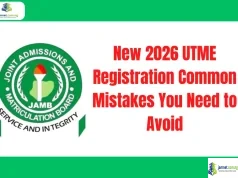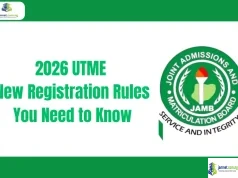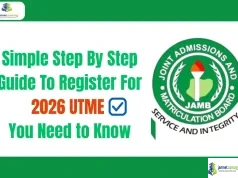This article presents a strategic guide for Nigerian students aiming to secure fully-funded Masters scholarships abroad by selecting Top 10 Most International Sought After Courses You Can Study In Nigeria With Low JAMB Cut-Off Marks (140–180). It argues that prioritizing academic excellence, specifically achieving a First or Second Class Upper, in niche, high-demand fields such as Geosciences, Statistics, or Agricultural Economics provides a superior pathway to securing international funding compared to competing for highly saturated courses. The essential strategy for success involves maintaining a high Cumulative Grade Point Average (CGPA), demonstrating leadership, and aligning the undergraduate degree with specific global development goals to satisfy international scholarship committees.


Top 10 Most International Sought After Courses You Can Study In Nigeria With Low JAMB Cut-Off Marks (140–180) and Win a Scholarship for Masters
The goal of securing a competitive career begins with a university degree, but for many Nigerian students, high JAMB cut-off marks (often 200 and above) for highly competitive fields such as Medicine, Law, and Core Engineering can be a significant obstacle.

Join our Telegram Channel for Instant Scholarship Updates
A strategic approach, however, recognizes that a fulfilling career and a successful Masters scholarship application do not depend solely on a high initial cut-off score. Instead, success relies on choosing globally relevant courses that are available in institutions with lower benchmarks. This article outlines ten internationally sought-after courses with cut-off marks typically between 140 and 180, and explains how excellent performance in these fields can create a clear path to securing prestigious, fully-funded Masters scholarships abroad.
Advantages of Choosing These Courses: Lower Competition, Higher Global Relevance
The essential strategy is to select courses that are fundamental to addressing global challenges (such as sustainable development, technological integration, and environmental needs) but are not currently saturated in the Nigerian admissions process. These courses are often found in state, private, or newer federal universities where the admissions pressure is less intense.
A strong undergraduate performance (First Class or Second Class Upper) in a focused but globally relevant field is much more valuable for a Masters application than a lower grade in a course that is highly saturated.
List Of Top 10 Most International Sought After Courses You Can Study In Nigeria With Low JAMB Cut-Off Marks (140–180) and Win a Scholarship for Masters
Here are ten low JAMB courses with high-value, internationally recognized typically accessible with lower cut-off marks, and their strategic benefits:
1. Geosciences and Environmental Management
- Global Relevance: Climate change mitigation, sustainable resource exploration, energy transition, and water security. This field is a key part of the global economy’s move toward sustainability.
- Masters Scholarship Link: Environmental Science and Geology are heavily funded internationally (Chevening, Commonwealth, DAAD) because of their direct link to global climate and developmental goals.
2. Agribusiness and Agricultural Economics
- Global Relevance: Food security, supply chain optimization, rural development, and international trade. Agriculture is an economic priority area for international development agencies like the World Bank.
- Masters Scholarship Link: Numerous scholarships exist in Food Security, Agricultural Policy, and Development Economics. They value candidates who demonstrate practical, regional relevance combined with economic knowledge.
3. Mass Communication and Digital Media Studies
- Global Relevance: Digital marketing, data journalism, communications for international organizations (NGOs, UN), and policy advocacy. Every modern organization requires communication experts skilled in technology.
- Masters Scholarship Link: Strong candidates with portfolios in digital analytics or strategic communication are sought for Masters programs in Digital Media and Public Relations abroad.
4. Library and Information Science (Focus on Data and Archiving)
- Global Relevance: Data management, data science foundations, corporate archiving, and information security. This provides the organizational structure for managing big data.
- Masters Scholarship Link: This is an excellent foundation for Masters programs in Data Science, Information Systems Management, and Archival Studies, especially where technology meets organizational knowledge.
5. Estate Management and Valuation
- Global Relevance: Urban planning, sustainable infrastructure development, property technology (PropTech), and real estate investment analysis.
- Masters Scholarship Link: This degree offers an ideal foundation for postgraduate studies in Urban Planning, Infrastructure Development, and specialized Real Estate Finance, which are strongly funded areas in Europe and North America.
6. Theatre Arts and Film Studies (Focus on Cultural Diplomacy)
- Global Relevance: Cultural exchange, creative industries management, media production, and cultural diplomacy—all essential for soft power influence.
- Masters Scholarship Link: Masters scholarships in Creative Arts Management, Cultural Policy, and Digital Filmmaking are available, particularly for candidates who link their creative work to national identity or social advocacy.
7. Fisheries and Aquaculture
- Global Relevance: Sustainable seafood production, marine conservation, and blue economy development. This field is critical for solving global protein supply challenges.
- Masters Scholarship Link: This is a highly specific and therefore less competitive route for scholarships focused on Marine Biology, Aquaculture Technology, and Conservation Policy, which are often funded by coastal nations and Non-Governmental Organizations.
8. Statistics and Mathematics
- Global Relevance: These fields provide the fundamental building blocks of data science, artificial intelligence, and quantitative finance. There is high global demand for strong quantitative skills.
- Masters Scholarship Link: A high CGPA in Statistics or Mathematics is a direct pathway to top-tier, well-funded Masters and PhD programs in Data Science, Actuarial Science, and Financial Engineering globally.
9. Adult Education and Community Development
- Global Relevance: Non-profit management, policy implementation, Public Health outreach, and international development work (NGOs, UN agencies).
- Masters Scholarship Link: This degree is a strong entry point for Masters in International Development, Public Administration, and Non-Profit Management, fields heavily supported by development-focused scholarships.
10. Linguistics and Foreign Languages (e.g., German, Chinese)
- Global Relevance: Diplomacy, translation, language processing in technology, and cross-cultural communication. Fluency in high-demand foreign languages offers a distinct professional advantage.
- Masters Scholarship Link: This often leads to fully-funded programs in Language and Intercultural Communication, or Translation Studies in countries that speak that language (e.g., DAAD in Germany).
Maximizing Your Masters Scholarship Potential
Winning a fully-funded Masters scholarship (such as Chevening, Fulbright, or Commonwealth) depends less on the name recognition of your undergraduate degree and more on three critical factors:
1. The Undergraduate Performance (CGPA)
For a Masters scholarship, your Cumulative Grade Point Average (CGPA) is paramount. A less competitive course that allows you to secure a First Class (4.50–5.00) or a strong Second Class Upper (3.50–4.49) is significantly better than a challenging, competitive course where you achieve a Second Class Lower. The lower entry barrier in the recommended courses gives you a key advantage for achieving top grades.
2. Demonstrated Global Impact and Leadership
Scholarship committees seek evidence of leadership and impact. While studying, you must actively pursue opportunities related to your field:
- For Agribusiness: Volunteer with local farmers, start a community farm initiative, or develop a micro-business plan.
- For Environmental Management: Participate in community sanitation projects, or join student groups focused on sustainable development advocacy.
- The Nexus: Connect your work to global frameworks, such as the UN Sustainable Development Goals (SDGs). This is the customary language used in international scholarship applications.
3. Clear Career Goals (The “Why”)
When applying for a Masters, you must clearly explain why your chosen Nigerian undergraduate degree is the ideal foundation for the proposed Masters program abroad, and how you will use that foreign degree to create an impact in Nigeria upon your return.
- Example Statement: “My BSc in Statistics equipped me with strong quantitative analysis skills, but I require an MSc in Financial Technology (FinTech) to apply these skills to developing secure mobile lending platforms for underserved markets in West Africa.”
By choosing a course with a lower entry barrier but high intrinsic global value, and coupling that choice with an exceptional CGPA and impactful extracurricular activities, Nigerian students can strategically avoid local competition and position themselves directly for major international academic funding. It is important to view your undergraduate course choice not as a final destination, but as a strategic launchpad.
Frequently Asked Questions (FAQ)
1. Is it possible for me to secure a scholarship with a Second Class Lower degree? While difficult, it is possible. Applicants must demonstrate exceptional professional work experience, impactful volunteering, and very strong standardized test scores (such as GRE or GMAT) to compensate for the lower Cumulative Grade Point Average (CGPA).
2. What is the minimum acceptable JAMB score for these courses? The minimum acceptable score is typically 140, which is the institutional floor set by JAMB. However, competitive admission begins at approximately 160 to 180 in many universities, particularly for the courses listed.
3. Does studying at a State University disadvantage my scholarship application? No, it does not disadvantage an application. Scholarship committees prioritize the academic quality of the degree, the Cumulative Grade Point Average (CGPA), and the applicant’s leadership experience over the specific type of Nigerian university attended.
4. Which scholarships are most suitable for candidates from these fields? The most suitable scholarships are development-focused programs such as Chevening (United Kingdom), Fulbright (United States of America), Commonwealth Shared Scholarships, and DAAD (Germany). These programs highly value the link between the course and the applicant’s proposed contribution to national development.
5. Should I retake JAMB to aim for a higher cut-off course? Retaking the examination is an option, but the recommended strategic alternative is to focus intently on achieving a First Class or strong Second Class Upper in one of the lower cut-off, high-demand courses. The quality of the undergraduate grade is usually more important than the perceived prestige of the course.
6. How important is the Statement of Purpose for these applications? The Statement of Purpose is extremely important. It must clearly articulate the need for the Masters program, link the undergraduate course to the advanced study, and explain the concrete plans for creating impact upon return to Nigeria.
7. Must I have work experience before applying for a Masters scholarship? For many competitive scholarships, professional or significant volunteer experience (typically two years) is mandatory. It is advised that applicants plan to gain relevant experience immediately after the National Youth Service Corps (NYSC) program.
8. Do these courses lead only to academic careers? They do not. Courses such as Statistics lead to careers in FinTech and data science. Agribusiness leads to entrepreneurial roles in supply chain management. These fields have vast professional applications outside of academia.
9. If my course is called “Geography,” is it the same as “Geosciences and Environmental Management”? The name may vary by institution. It is crucial to check the course curriculum. If the curriculum contains modules on climate modeling, Geographic Information Systems (GIS), or renewable energy, it is relevant for a Geosciences Masters.
10. Is it better to study a highly demanded course like Law at a private university? If the student can achieve a top Cumulative Grade Point Average (CGPA) at the private institution, it can be a good choice. However, the financial cost is high, and the strategic path remains maximizing the CGPA in a globally relevant field, regardless of the institution type.













